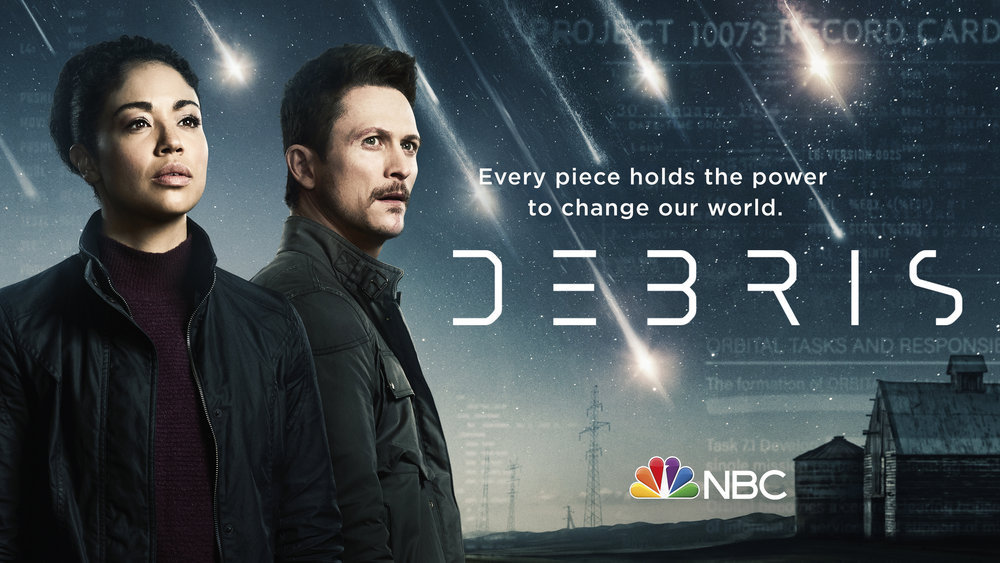After the massive success of “Lost” on ABC, every network was searching for a similar phenomenon, something that would get people guessing about what would happen next, and most of these shows involved aliens. From “Threshold” to “Invasion,” the subgenre burned itself out pretty quickly, although there’s often at least one show on network TV shooting for that same water cooler energy. NBC now has two. Following in the footsteps of their twisty and disappointing “Manifest” is Monday’s “Debris,” another show about interstellar visitors but one that seeks to be more “Arrival” than “Independence Day.” The premiere admirably drops viewers into the deep end, eschewing much of the typical set-up for what feels more like a third or fourth episode, but it also suffers a bit from superficial, manipulative writing, and an over-familiarity that could make it a tough sell. Most of all, it’s another case of a show that’s incredibly hard to cover or stand-out after only one episode screened for press. The concept and cast are strong enough that it could become another “Fringe,” or it could run out of ideas in a couple of weeks and drag itself along the finish line to cancellation like so many similar shows did about a decade ago.
Wreckage from a downed alien spacecraft has plummeted to Earth, leaving debris all over the planet, and this interstellar material is causing chaos. What if debris from other civilizations could alter the physics of our planet? The premiere opens with agents searching for the debris and what appears to be a sale of a particular piece at a hotel. When the exchange gets busted, the seller hides the debris in a hotel hallway, only for it to be discovered by a housekeeper. She picks it up and immediately phases through the floor and all the ones below it until the ballroom at the bottom, essentially plummeting to her death. It’s an engaging cold open, introducing the idea of alien material on the planet so powerful that it alters mankind in a potentially dangerous way.

The premiere then shifts to a boy on a deserted road, driving with his mother. After saying something about circus performers, the boy kind of freezes, and the mother’s eyes start to bleed. The car slowly comes to a stop, and the mother’s body is later found floating in a field. The Mulder & Scully of “Debris,” played by Jonathan Tucker and Riann Steele, pop up to investigate the strange occurrences at the hotel and in the field, and they discover that the death of a child is at the center of this truly unexplainable phenomenon. How is the child’s death and apparent resurrection related to the debris? And what they can do to stop it?
“Debris” is an undeniably fast-paced hour, which could be all anyone needs on a Monday night, and it’s on the upper half of the “intellectual sci-fi TV” scale in terms of plotting. There’s some fresh ideas and imagery here, including the excellently shot sequence in which the agents find the floating mother … and what she’s floating toward. Some of the dialogue succumbs to simple sci-fi Mad Libs—it’s only about ten minutes in when someone says, “In the wrong hands, it could be the end of humanity”—but a show like “Debris” is best judged by its potential when critics are presented only one episode, and that kind of cheesy writing can be ironed out. I’m also a bit tired of premieres that hinge on manipulative melodrama like the death of a child (or one in jeopardy), but, again, that’s probably not something “Debris” will do every week.
The only real question one needs to answer after a TV pilot is “Will I watch another one?” It’s funny how time can change that consideration. Two decades ago, “Debris” would have felt new. A decade ago, it would have felt even more like a rip-off of “Lost” or “Fringe.” Now, it has to fight through all the overcrowding, finding a way to stand out with so many options every single week. Will I watch another one? Maybe. But I also might forget it even exists.
One episode screened for review.












